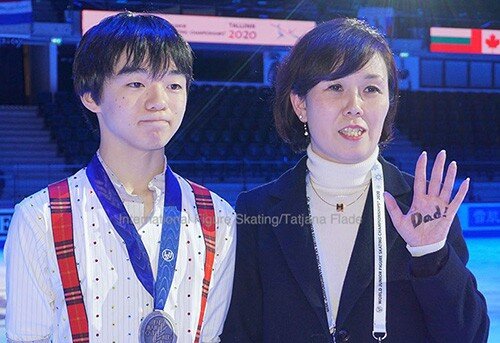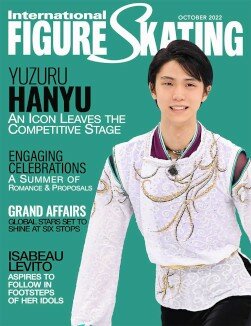

Japan’s Yuma Kagiyama was one of the standouts in the junior ranks last season. The teenager, who turned 17 on May 5, rose from relative obscurity to capture the world’s attention with his solid performances and bright personality.
Kagiyama made his international debut on the junior circuit in the 2018-2019 season. That experience inspired and motivated the teenager to train harder and become a better skater. During the offseason, he began working on the quad toe with a particular determination to not repeat the fourth-place finish he achieved in Canada in 2018.
The Karuizawa native first captured the spotlight in August 2019 when he claimed the title at the Junior Grand Prix in Courchevel, France. He followed that up with a silver medal at his second event in Gdańsk, Poland, and punched his ticket to the Junior Grand Prix Final in Torino, Italy.
Though his performances at the Final fell far short of his best — he finished fourth — it would ultimately be the only event of the 2019-2020 season at which he did not land on a podium. Two weeks after that disappointing result, Kagiyama won the Japanese junior title and captured bronze at the senior-level Championships, finishing ahead of Yuzuru Hanyu in the free skate.
That successful run continued at the Youth Olympic Games in Lausanne, Switzerland, in January where he struck gold ahead of Russia’s Andrei Mozalev and Daniil Samsonov, both of whom had finished ahead of him in Torino.
Kagiyama claimed bronze in his senior international debut at the Four Continents Championships in February. He was surprised to finish third with two personal best scores in what was a very competitive field headlined by Hanyu. “I could never have imagined I would get a medal at that competition. I was in shock,” Kagiyama said. “I worked really hard, so that result was a good reward. But still I was surprised.”
Kagiyama headed into the World Junior Championships in Tallinn, Estonia, as a top contender to take the title. He skated to a narrow lead over Mozalev in the short program but three technical errors dropped him to fifth in the free and he finished in second place overall. “This is the first season I put the quad toe into my program and it was quite successful. It was actually pretty consistent from the beginning and it felt good.
“Talking about my improvement during the season, I feel the positions of the spins were more defined, and my basic skating skills and expression were improved. At each competition I learned something that I could build on,” he explained. “Every competition kind of gave me mental strength, and I feel like I can now challenge each competition with a stronger mindset.”
Kagiyama is coached by his father, Masakazu Kagiyama — the 1989 World Junior bronze medalist, a three-time national champion and a two-time Olympian — in Yokohama. “At first, my father was coaching and I was just playing around. Then, when I started to skate I enjoyed it and I wanted to learn and start training seriously,” he recalled. “I am not treated special. I feel I am very equal to all his students. He is not too strict, but when there is a tough moment, or when he gets upset then he gets a little scary. But I practiced really hard, so that has not happened for a long time. My father has a lot of experience and he passes it on to me. He talks to me about how he felt when he competed. There are only good things — I have never felt any pressure.”
Though Kagiyama is the only high-level skater at his rink, he acknowledges that the young skaters coming up behind him are “actually quite good. “It might be a good idea to train with skaters at the same level in a competitive environment for maybe a week, but basically I am happy with my environment right now.”
Jumping is his favorite part of skating, especially the quad. He said it “feels really, really good. That is part of the attraction.”
The past two years his father has suffered from health problems and has been unable to travel outside Japan to attend competitions with his son. Instead, Kagiyama’s choreographer, Misao Sato, took on the role of coach. “I did not really talk to my father during the World Junior Championships, but before the competition he sent me a text message and I tried to remember his words,” said Kagiyama. “I contacted him after the free skate and he told me that I skated quite well. He also said that now it is time to relax and rest.”
Kagiyama, who finished 17th in the season standings, is headed to the senior ranks full-time next season. He plans to get two new programs and is aiming to add a quad Salchow to the long. “The main difference from the juniors to the seniors is the amount of experience the senior skaters have because they do a lot more competitions,” said Kagiyama.
“I still don’t have enough experience, but I am hoping to do a lot more competitions next season.”




